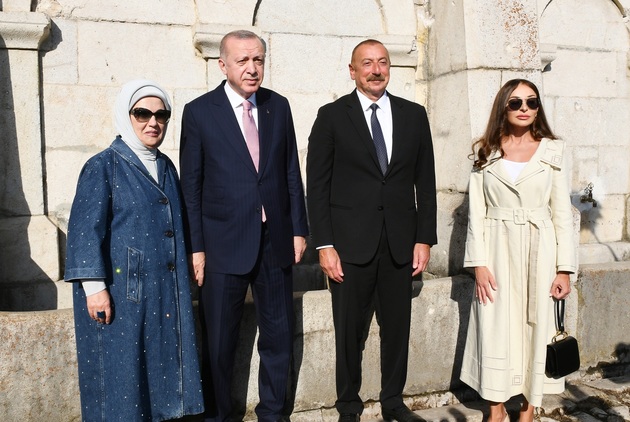Today, at a meeting in Baku with his Azerbaijani counterpart Zakir Hasanov, Turkish Defence Minister Hulusi Akar claimed that Ankara is ready to mobilize all its capabilities to solve any problem to occur in Azerbaijan since both countries share a common history and the brotherhood of peoples is of eternal nature. The concept of One Nation-Two States of Turkey and Azerbaijan has a long history based on a common history, culture, and language, The Hurriyet Daily News writes.
Turkey was the first country to recognize Azerbaijan’s independence from the Soviet Union. Today, the concept of One Nation-Two States has very broad support in Azerbaijani society, especially since the country’s victory in the 44-day Second Karabakh War last year. Turkey made the normalization of relations with Armenia conditional on its withdrawal from occupied Azerbaijani lands. The concept of One Nation-Two States become more clarified culminating in the June 2021 Shusha Declaration signed by Turkish and Azerbaijani Presidents Recep Tayyip Erdoğan and Ilham Aliyev. In the last decade, Turkey has become the main conduit for the export of Azerbaijani oil and gas, Azerbaijan became a major investor in Turkey, the number of Azerbaijani officers training in Turkish military colleges increased, and the number of joint military exercises grew. Azerbaijan purchased modern Turkish military equipment, such as drones
The concept of One Nation-Two States is not unique to the South Caucasus. Romania and Moldova and Albania and Kosovo are the closest analogies of two countries from the same ethnic group and speaking the same language. But of these two examples, only Romania and Moldova share the same blue, yellow, and red flags. Turkey and Azerbaijan, like Albania and Kosovo, have different flags. Another example is two states on the Korea peninsula that resemble the two parts of Germany until they were reunited in 1990.
Unfortunately, not all cases of the concept of One Nation-Two States are benevolent. Serbia and Montenegro are in conflict over whether Montenegrins are “Serbs” or a separate nation. A separate Macedonian identity appeared in Communist Yugoslavia, much to the annoyance of Serbs. Since Macedonia became an independent state in 1991, Greece and Bulgaria have continued to remain reluctant to recognize the existence of a Macedonian nation. Greece denies the existence of its Macedonian minority while Bulgaria declares them to be “Bulgarians.” Some Russian nationalists have always denied the existence of Belarusians and Ukrainians believing they are Great Russian, White Russian (Belarusian) and Little Russian (Ukrainian) branches of a pan-Russian nation.
Azerbaijanis’ credit both their own authorities and Turkey with the liberation of occupied lands held by Armenia for nearly three decades. The Shusha Declaration was the first occasion where two countries, one from the former USSR and a NATO member, signed a strategic partnership which amounts to a de facto security pact. President Erdoğan has stated that Turkey will not hesitate to stand against those who attack Azerbaijan.
The Shusha Declaration states that “if there is a threat or an act of aggression from a third state or states against their independence, sovereignty, territorial integrity, the inviolability or security of their internationally recognized borders, the parties will hold joint consultations. After determining through urgent discussions the volume and form of such possible assistance, a decision will be made to secure defense needs for the adoption of joint measures and coordinated activities will be organized of power-wielding and administrative agencies of the Armed Forces.”
Since last year’s 44-day war, military, security, and economic cooperation has expanded between Turkey and Azerbaijan. Turkish companies are involved in rebuilding the destroyed infrastructure of Western Azerbaijan destroyed during three decades of Armenia’s occupation. The Shusha Declaration spells out many areas for future cooperation in developing military technology, joint military exercises, enhancing cyber security and combatting terrorism against Turkey. Closer integration and development of the strategic partnership outlined in the Shusha Declaration will continue to grow, nevertheless, “the establishment of an Azerbaijani-Turkish confederation is unlikely in the near future.” The concept of One Nation-Two States will therefore remain and will not be replaced by One Nation-One State.






